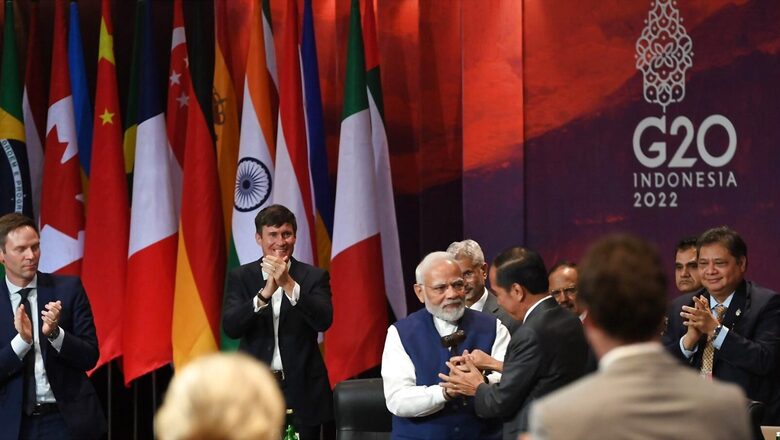
views
India was on Wednesday handed over the G-20 presidency by Indonesia at the end of the two-day summit in Bali. Prime Minister Narendra Modi addressed the closing ceremony, saying digital transformation should not be confined to a small part of the “human race” and its greater benefits will be realised only when digital access becomes “truly inclusive”.
Modi also strongly pitched for a pledge by the G-20 leaders to work for bringing digital transformation into the life of every human being in the next 10 years so that no person is deprived of the benefits of the new technologies. In a session on digital transformation, the prime minister also said that principle of “data for development” will be an integral part of the overall theme of India’s upcoming G-20 Presidency.
Showcasing India’s digital transformation, he said the country has developed digital public goods whose basic architecture has in-built democratic principles but rued that citizens of most developing countries do not have any kind of “digital identity”.
A Digital Pitch
Modi said India’s experience in the past few years has shown that if digital architecture is made widely accessible, it can bring about socio-economic transformation. “Digital transformation is the most remarkable change of our era. The proper use of digital technologies can become a force multiplier in the decades-long global fight against poverty,” Modi said.
“Digital solutions can also be helpful in the fight against climate change — as we all saw in the examples of remote-working and paperless green offices during the Covid-19 pandemic,” he said The prime minister said these benefits will be realised only when digital access becomes truly inclusive and when the use of digital technology is really widespread.
India will assume the G-20 Presidency for the coming year. Our agenda will be inclusive, ambitious, decisive and action-oriented. We will work to realise all aspects of our vision of ‘One Earth, One Family, One Future.’ pic.twitter.com/fRFFcDqpzO— Narendra Modi (@narendramodi) November 16, 2022
Unfortunately, till now we have seen this powerful tool only from the criteria of simple business, keeping this power tied in the ledgers of profit and loss,” he said.
It is the responsibility of us G-20 leaders that the benefits of digital transformation should not be confined to a small part of the human race,” he noted. Modi said India is making digital access public, but there is still a “huge digital divide” at the international level, adding digital use can bring scale and speed and transparency can be brought into governance.
“India has developed digital public goods whose basic architecture has in-built democratic principles. These solutions are based on open source, open APIs, open standards, which are interoperable and public,” he said.
UPI & CoWin
“This is our approach based on the digital revolution that is going on in India today. Take, for example, our Unified Payment Interface (UPI),” he said. Modi said over 40 per cent of the world’s real-time payment transactions took place through UPI last year.
((The National Payments Corporation of India developed the Unified Payments Interface, which is an instant real-time payment system. The interface enables peer-to-peer and person-to-merchant transactions between banks. It is used on mobile devices to transfer money between two bank accounts in real time.))
“Similarly, we opened 460 million new bank accounts on the basis of digital identity, making India a global leader in financial inclusion today. Our open-source CoWIN platform made the biggest vaccination campaign in human history, a success even during the pandemic,” he said.
((The Ministry of Health and Family Welfare in India owns and operates CoWIN, an Indian government web portal for Covid-19 vaccination registration. It displays Covid-19 vaccine booking slots that are available in the surrounding areas and can be booked on the website.))
The prime minister said citizens of most developing countries of the world do not have any kind of digital identity. “Only 50 countries have digital payment systems. Can we take a pledge together that in the next 10 years we will bring digital transformation in the life of every human being so that no person in the world will be deprived of the benefits of digital technology,” he noted.
“During its G-20 Presidency next year, India will work jointly with G-20 partners towards this objective. The principle of “Data for development” will be an integral part of the overall theme of our Presidency “One Earth, One Family, One Future”,” he added.
G20 Sherpa Explains
Amitabh Kant, India’s G20 Sherpa, told Economic Times Online on the sidelines of the summit that India has built a unique model of digital transformation based on public digital infrastructure. “This demonstrates that India has accomplished in six to seven years what it could not have accomplished in fifty years. This is supported by a Bank of International Settlements study.”
Kant went on to say that UPI is just one of the tools that represent India’s digital prowess. “Aadhaar, Diksha, Swayam — it’s all about the public infrastructure that India has accumulated over the years.” We created Ulip [Unified Logistics Interface Platform], ONDC [Open Network for Digital Commerce], and FASTag. India will discuss them [at the G20 summit] and bring them to the rest of the world.”
He went on to say that digital transformation is the key to making a significant impact on achieving sustainable development goals in the areas of poverty, education, health, and direct benefit transfer.
Read all the Latest Explainers here




















Comments
0 comment